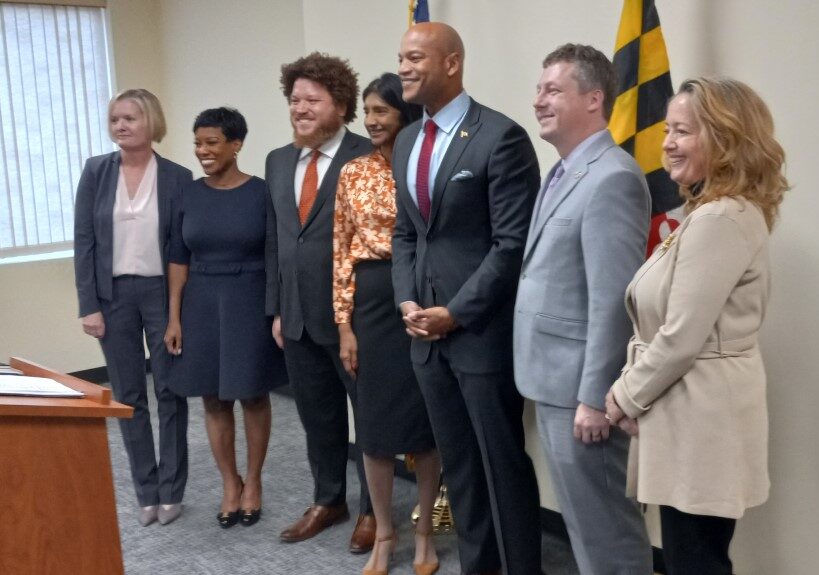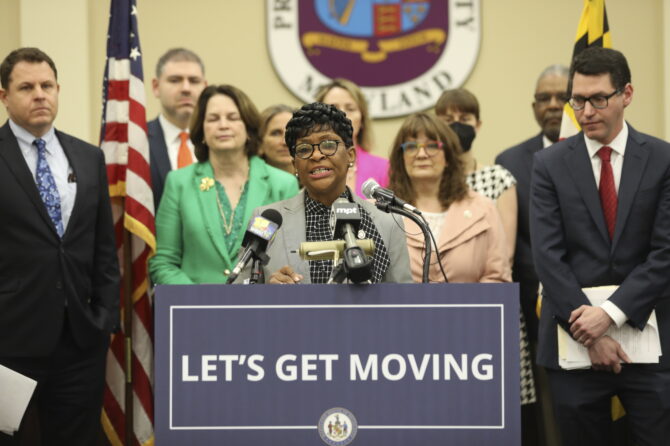MARYLAND MATTERS: Eight years ago, a week before Election Day, I published a column on Center Maryland speculating about who might be getting cabinet positions and other prominent roles in the anticipated administration of Anthony Brown, the Democratic nominee for governor (don’t bother looking for it on Center Maryland’s archives — most of the pieces from that era have vanished).
The day after that column appeared, I ran into Ken Ulman, the Democratic nominee for lieutenant governor, at the Montgomery Business Hall of Fame annual luncheon, greeting people as they came in. Ulman praised my column and said I had gotten just about everything right, with one or two notable exceptions. I was feeling pretty good about myself.
But standing just a few feet from Ulman, also pressing the flesh, was the Republican nominee for governor, Larry Hogan. “I’m going to win,” Hogan told me confidently.
It sounded less like hyperbole than prognostication from a man who actually knew what was about to happen. It had already dawned on me that Hogan could in fact win, but it still seemed more likely that Brown was going to be the next governor.
Still, I realized I ought to get to work on a Hogan cabinet piece, which eventually came out a week or so after the election. It wasn’t quite as extensive or airtight as my hypothetical Brown administration column, but it featured some good guesses and logical conclusions.
Since Election Day this year — actually, well before Election Day, as the result seemed like a foregone conclusion — people have been asking me when I’m going to write a column looking at Gov.-elect Wes Moore’s prospective cabinet and roster of top advisers, and for a long time, it was my intention to do just that. But as time has gone on, I’ve become less comfortable with the idea, for a variety of reasons.
When Moore announced the first five appointments to his administration, less than a week after the election, I knew about all of them, to one degree or another, and felt pretty good about that. I stumbled into figuring out that Fagan Harris was going to be his chief of staff only after seeing Amelia Chassé Alcivar, Hogan’s chief of staff, giving Harris a tour of the State House a couple of days before the announcement. Sometimes it’s better to be lucky than good.
So why wouldn’t I want to offer some educated speculation about the rest of Moore’s team? Plain and simple, it was easier to imagine a Brown team than it is to expertly cobble together a Moore team now.
For one thing, if Brown had been elected, there would have been plenty of continuity between his administration and the administration of outgoing Gov. Martin O’Malley (D), whom Brown had served as lieutenant governor. On top of that, Ulman, the outgoing Howard County executive, had a whole team around him for eight years, and many of his top folks were almost certain to join him in state government.
With Moore, it’s trickier to know who he’s close to and who he might want to bring with him into his administration. Moore is not a creature of Annapolis or the Maryland political world. He’s had a broad range of professional experiences and thus has more networks than your average politician. He’s relying on a headhunter and making national searches for certain positions.
I’ve heard plausible names for every top post in state government and some of these folks no doubt will wind up working for Moore. But when you do a little digging, oftentimes the chatter about the names you hear for key positions are coming directly from the wannabes who wish to serve in the administration or from people who are close to them. It doesn’t mean they won’t get the job they want, or another prominent position in the administration — just that we haven’t reliably heard anyone close to Moore touting these individuals.
Although his wife, Dawn Flythe Moore, worked in the Glendening administration and for Anthony Brown, and her ex-colleagues and political contacts have served Moore well as advisers of varying degrees of intimacy, Moore himself does not have a large circle of close confidants with a lot of Annapolis experience. Lt. Gov.-elect Aruna Miller (D), who is heading Moore’s transition team, served eight years in the House of Delegates and is well-liked and well-respected in state political circles. But she doesn’t have a huge cadre of insider advisers either.
Moore’s picks for top jobs in his administration so far don’t offer a lot of clues about what the overall team is going to look like. There are a couple of seasoned state government hands, for sure, but there are also folks, like Harris, who are complete outsiders, who may have sound, innovative visions of governing, but little practical experience, who can talk with pride about their Palo Alto days or White House fellowships, but couldn’t tell Gerry Evans from Joel Rozner, may never been to Eastport or Easton, and have no clue where to hold a meeting off-campus in the state capital where you wouldn’t be detected.
This may be perfectly OK. Moore is without fail going to surround himself with smart people. New blood is good. Annapolis in some ways is a pretty calcified place. But it simply makes the job of projecting who’s going to land in the administration too risky to do so publicly.
That said, if anyone has any ideas, intel, good guesses, or well-grounded theories, you know where to find me.
Adding to the uncertainty of what Annapolis is going to look like in a few short weeks is the fact that state Senate President Bill Ferguson (D-Baltimore City) has yet to announce who will chair the powerful Finance Committee beginning in January. Ferguson, several lawmakers and well-wired observers have said, wouldn’t mind Moore tapping a few of his members for jobs in the administration, giving Ferguson greater flexibility to hand out plum committee assignments than he has now.
With veteran Sen. Delores Kelley (D-Baltimore County) leaving the legislature and stepping down as Finance chair, a certain logic dictates that Ferguson would install another Black woman as Finance chair — which would put Senate President Pro Tem Melony Griffith (D-Prince George’s) in the driver’s seat. But what then becomes of Sen. Brian Feldman (D-Montgomery) — Kelley’s loyal vice chair and one of the legislature’s top policy experts on energy and health care, two of the most prominent subject areas in the committee’s portfolio? What kind of consolation prize does Feldman get if Griffith or someone else gets the gavel? Or does Ferguson have something up his sleeve that could produce an additional vacancy at the head of a committee?
In the Senate, Montgomery County already has one committee chair and three vice chairs. That could further complicate Feldman’s path.
Presiding officers in the General Assembly have so many factors to consider when they’re assembling a leadership team — race, ethnicity, gender, geography, ideology, seniority, subject expertise, loyalty, caucus politics, merit. Lawmakers who want to move up have to chart their own political pathways carefully. And no one’s perception of all these factors is the same.
It’s entirely possible that Moore will pick members of the Senate — and the House — for important jobs in his administration, with the requisite legislative reshuffling to follow. But for now, most of the legislative drama centers on the Senate. One school of thought says that Ferguson, for strategic reasons, is waiting for some more Moore announcements before disclosing his plans.
We can speculate all we want, about the Moore administration and about legislative musical chairs, and it’s fun to do. The waiting has real consequences, for advocacy groups, special interests and policymakers trying to figure out what the political dynamic next year is actually going to be like. But let’s keep calm and be patient: We should start hearing real answers very soon.
As for the possibility of Melony Griffith heading a committee she hasn’t served on before, I think we can all agree that if she can master the topic of prescription drug and health care benefits for government pensioners and make the subject matter compelling, as she did during Senate floor debates a few years ago, she can master anything.
Photo: Gov.-elect Wes Moore (D) and Lt. Gov.-elect Aruna Miller (D) flanked by their first round of appointees. Left to right: nominated Budget Secretary Helene Grady, nominated Appointments Secretary Tisha Edwards, Chief of Staff Fagan Harris, Chief Legislative Officer Eric Luedtke, and Chief Counsel Amanda LaForge. Photo by Josh Kurtz.











